Munich is known for its stunning architecture, rich history, and vibrant cultural scene. It offers visitors a unique glimpse into Germany’s Bavarian culture. It was the capital of Bavaria until it became part of Germany in the late 1800s, and offers lots of museums and tours of the former royal palaces. It was the site of the formation of the Nazi party, and has plenty of somber and interesting historical sites in and around the city.
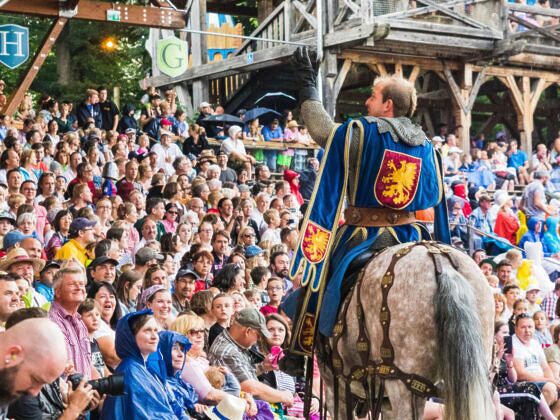
Of course, Munich has also been at the forefront of the country’s artistic and intellectual movements, with notable figures such as Johann Wolfgang von Goethe, Richard Wagner, and Thomas Mann all spending time in the city. It has exceptionally good Christmas markets, including one with a full medieval theme and another LGBT+-focused one, with everything decked out in bright pink.
But perhaps the city’s most well-known aspect are the festivals in Munich, including the world-famous Oktoberfest. These festivals are deeply ingrained in the city’s culture and have been celebrated for centuries, drawing visitors from all over the world. The festivals offer a unique opportunity to experience traditional Bavarian customs and cuisine while also enjoying live music, carnival rides, and other forms of entertainment. And good beer, of course.
Where to find the best festivals in Munich
The festivals in Munich below are in various parts of the city and some, like Oktoberfest, are celebrated throughout the whole state of Bavaria. The easiest way to get to these festivals is by public transportation, including buses, trains, and subways, which run frequently and efficiently throughout the city.
April and May: Frühlingsfest
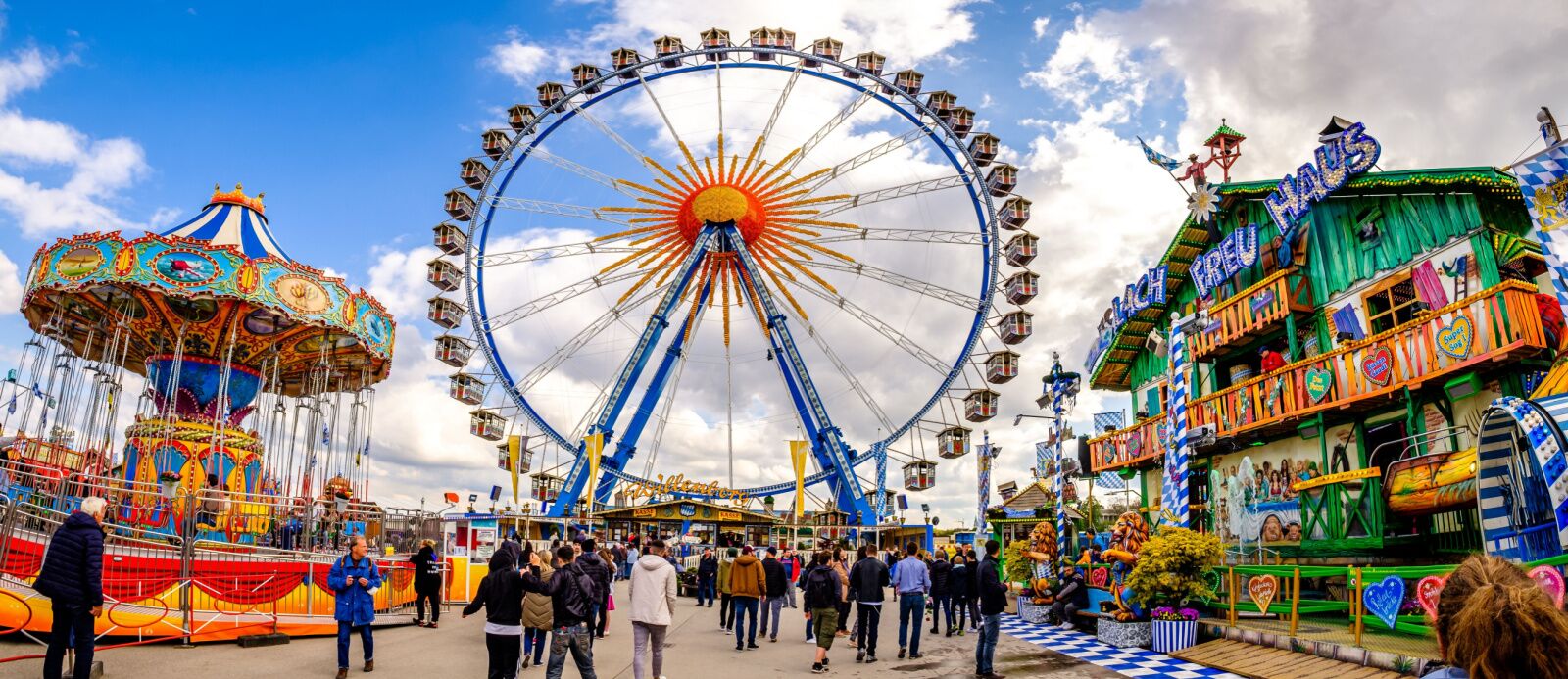
Phtoto: FooTToo</
Frühlingsfest, also known as the “Spring Festival,” is an annual two-week spring festival. The festival has its origins in the 1960s, when it was first held as a small-scale alternative to the world-famous Oktoberfest. Over the years, the festival has grown in popularity and now attracts thousands of visitors annually.
During the festival, visitors can expect to find many of the same attractions offered at Oktoberfest, including carnival rides, beer tents, and traditional Bavarian food and drink. However, Frühlingsfest is generally considered to be a smaller and more relaxed version of the September celebration, with a more family-friendly atmosphere. You can’t make reservations, unless you want to reserve an entire table for 10-12 people. Just show up and find a seat.
Frühlingsfest is held on the same fairgrounds as the Oktoberfest, but the layout is different. Instead of one large area with beer tents and rides, Frühlingsfest is spread out over several smaller areas, each with its own unique atmosphere and attractions. It’s one of the best festivals in Munich if you think you may be a bit overwhelmed by Oktoberfest, since it’s often called “Oktoberfest’s little sister.”
- Admission fee: Free
- Address: Theresienwiese, München
- Usual dates: Last week of April and first week of May
May, July, and October: Auer Dult
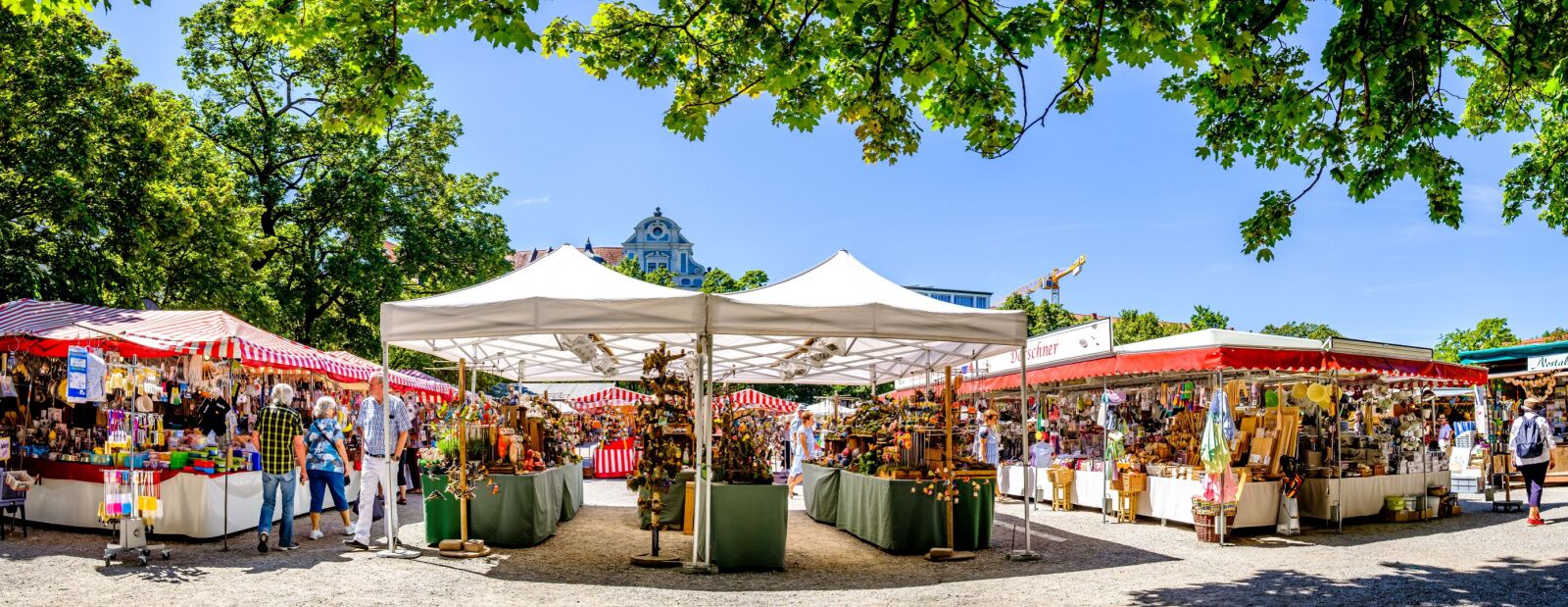
Photo: FooTToo/Shutterstock
Auer Dult is a traditional Bavarian folk festival hosted in Munich for more than 200 years. The festival takes place three times a year – in May, July, and October – and is named after the Auer Kirche, a church in Munich’s Au district where the festival was first held.
Auer Dult dates to the early 19th century, when it was primarily a market for local farmers to sell their goods. Over time, the festival grew to include carnival rides, food stalls, and traditional Bavarian crafts. It’s sort of like another famous festival in Munich – the Christmas markets – except it’s not Christmas-themed. But the layout is similar.
Visitors can expect to find a wide variety of items for sale, including pottery, textiles, and handcrafted goods, plus lots and lots of food stalls. Auer Dult also has a special area dedicated to antique dealers, where visitors can find rare and unique items from all over Europe. That area is known as the Antikmarkt – the antique market.
- Admission fee: Free
- Address: Mariahilfplatz, München
- Usual dates: First week of May, last week of July, middle of October
June and July: Munich Film Fest
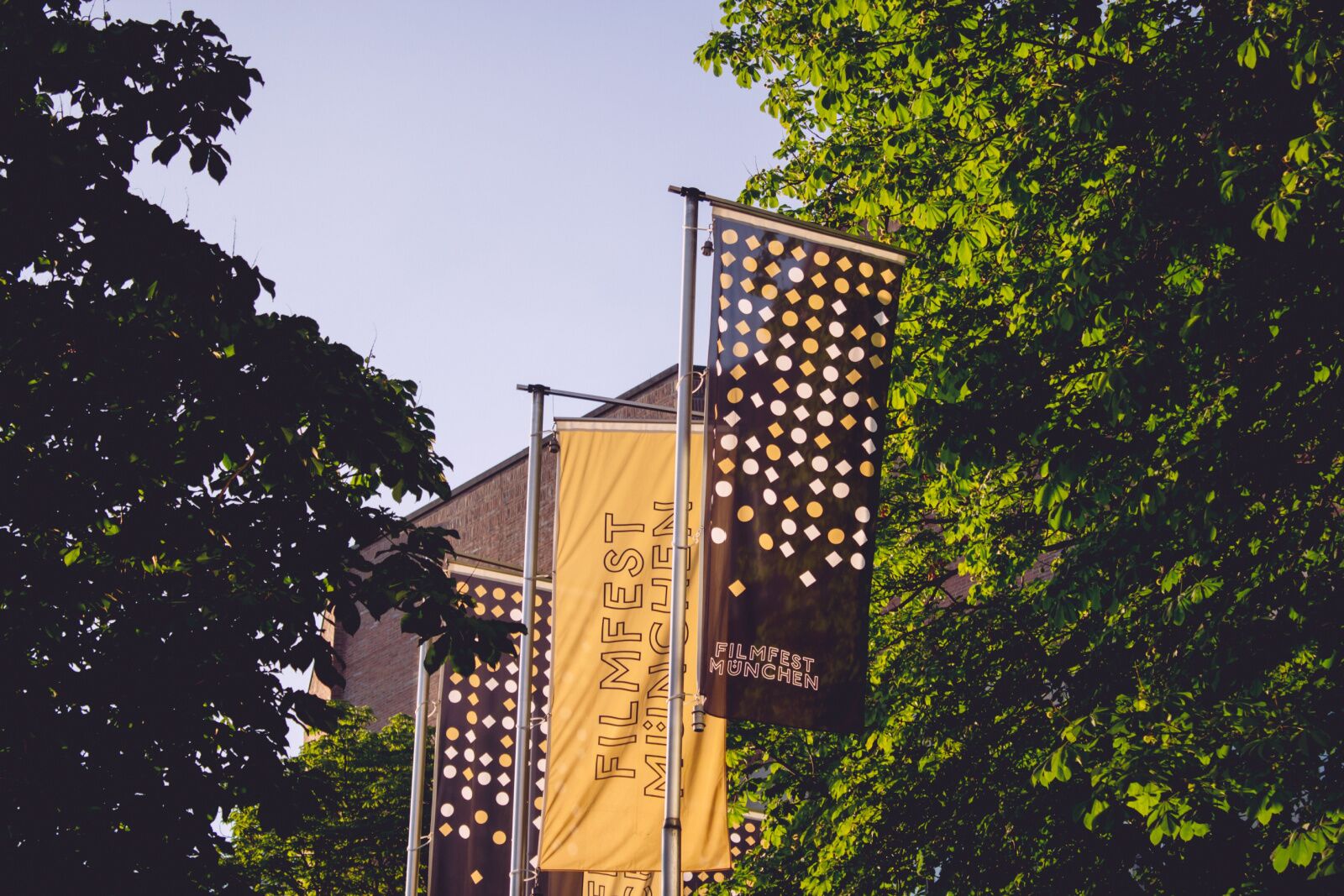
Photo: Timo Nausch/Shutterstock
The Munich Film Festival, also known as Filmfest München, is an annual film festival first held in 1983. Now, it’s one of the most important film festivals in Germany and Europe.
It’s played a significant role in promoting German and international movies, and has helped to launch the careers of many successful filmmakers. The festival often showcases films from up-and-coming directors and artists, as well as films that challenge traditional notions of cinema and storytelling. Movies you may recognize that were once shown as the festival include Moonlight (2016), 12 Years a Slave (2013), The King’s Speech (2010), and Slumdog Millionaire (2008).
The festival typically takes place in late June and early July and lasts for two weeks. During this time, visitors can expect to see a wide variety of films, including international feature films, documentaries, and short films. The festival also features workshops, panel discussions, and events with filmmakers and industry professionals. Events and movies are in English and German, though many of the panel events are in German only. And there’s also a section of the festival called New German Cinema, where movies are primarily in German.
- Admission fee: €5 per film or €30 for a pass
- Address: Most events are at the Gasteig (Rosenheimer Str. 5, 81667 München, Germany)
- Usual dates: Late June
July: Kaltenberger Ritterturnier
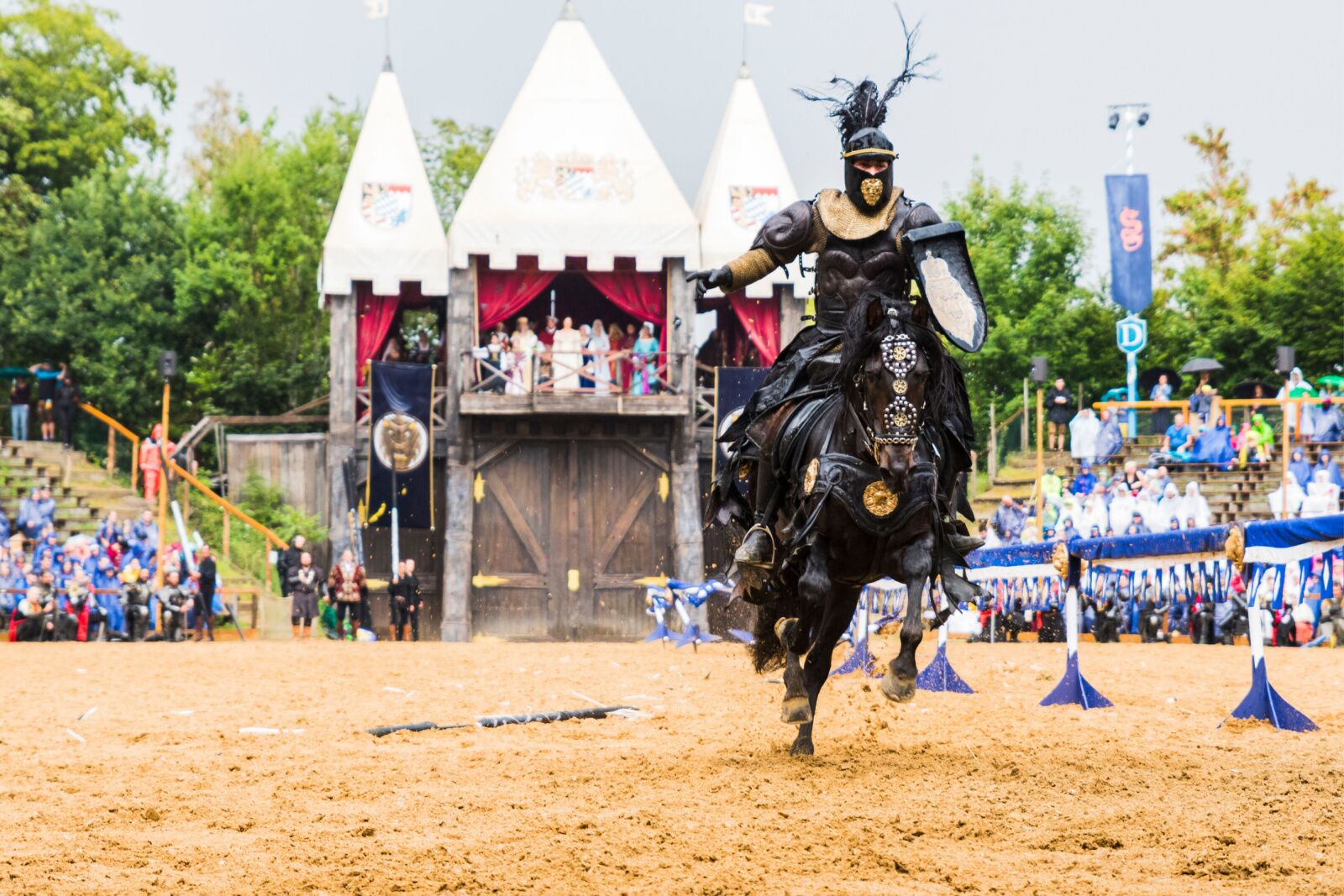
Photo: ihorga/Shutterstock
The Kaltenberger Ritterturnier, also known as the Kaltenberg Knights’ Tournament, is an annual medieval festival and jousting tournament held in Kaltenberg Castle, about 20 miles west of Munich. It’s typically held over two or three weekends in July.
During the festival, dozens of knights and their squires dressed in full armor engage in thrilling jousts and mock battles. The festival also features traditional crafts, food, and drink, as well as live music and other entertainment. It’s probably the best festival in Munich to attend if you like the type of Renaissance Festivals often hosted in cities around the US.
One unique aspect of the Kaltenberger Ritterturnier are the falconers and their birds of prey. Visitors can watch as trained falcons, hawks, and other birds are released to fly freely around the castle grounds, swooping down to catch prey or performing intricate aerial displays. The festival was canceled for a few years during COVID but should be back for 2023.
- Admission fee: Varies, starting at €39
- Address: Schloßstraße 10, 82269 Geltendorf, Germany
- Usual dates: Second and third weekends of July
July: Kocherlball
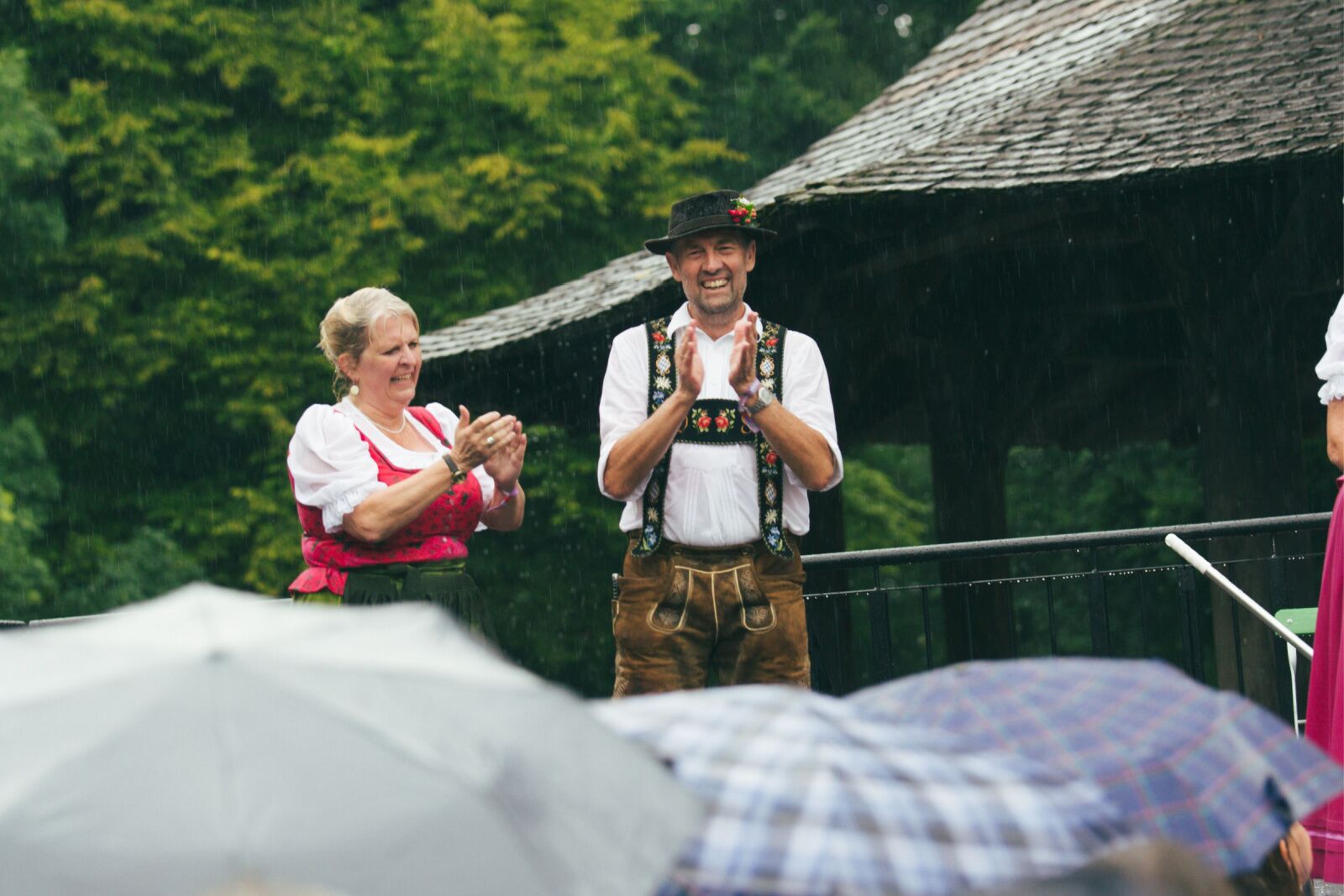
Photo: Timo Nausch/Shutterstock
Kocherlball is a traditional Bavarian ball – “ball” as in a fancy party, not as in a sports ball. It’s one of the best summer festivals in Munich, held in late July.
Kocherlball has a long and interesting history dating to the 19th century, when servants and kitchen staff in Munich would gather early on Sunday mornings to dance and socialize before the start of the workday. Over time, the event became more formalized, and it evolved into the soireé we know it for today.
The ball takes place in the early morning hours, typically 6 AM to 10 AM, as it has since it started. Visitors can expect to see traditional Bavarian clothing, including dirndls for women and lederhosen for men, as well as live music and dancing, plus traditional Bavarian food and drink. No reservations are needed and the event is free – just show up and find a spot to dance. Try to get there early as it’s magical when the venue is lit by candlelight and traditional musicians are on stage.
- Admission fee: Free
- Address: English Garden, Munich, Germany
- Usual dates: Third Sunday in July
September: Oktoberfest
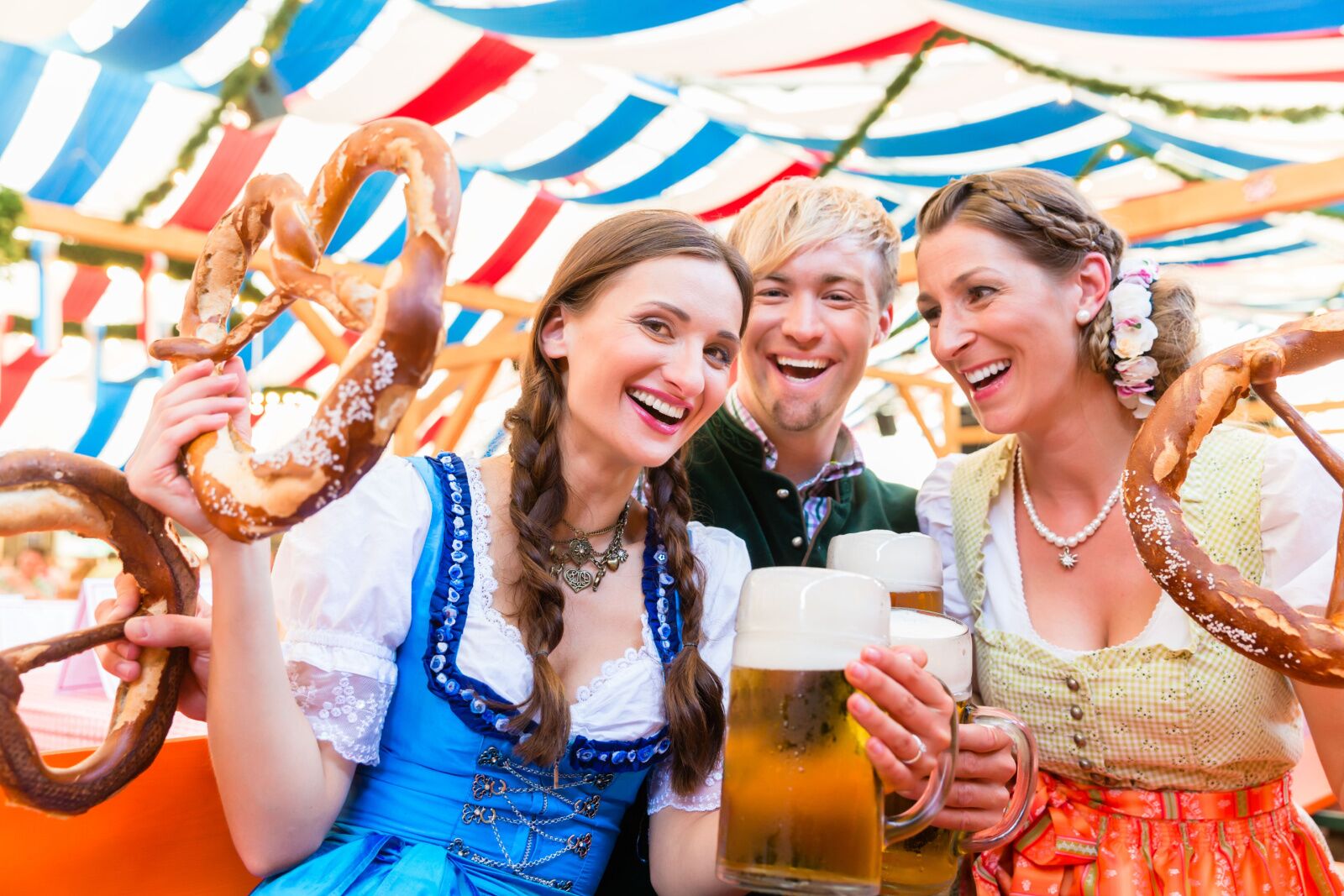
Photo: Kzenon/Shutterstock
Oktoberfest is the most famous festival in Munich – indeed, it’s possibly the most famous festival in the world. The annual festival is held in late September and early October and typically lasts for 16-18 days.
The origins of Oktoberfest can be traced back to 1810 when Bavarian Crown Prince Ludwig married Princess Therese of Saxony-Hildburghausen. They held a horse race to celebrate their marriage on the fields in front of the city gates, which became known as Theresienwiese (Therese’s Meadow).
The horse race was such a success that they decided to do it every year, and over time, other attractions were added, such as carnival rides and games. The festival also began to include beer tents and beer gardens, where visitors could enjoy the famous Bavarian beer and traditional food.
Visitors can expect to see various attractions, including carnival rides, games, and live music. The festival is also known for its traditional Bavarian clothing, such as dirndls and lederhosen – plus lots of beer. Expect Oktoberfest to get crazy, with wild events and incredibly lively celebrations. Make your hotel reservations as far in advance as possible, as the city fills up and it’s impossible to get last-minute hotel rooms.
- Admission fee: Tents are usually “free” but have a mandatory beer/food purchase
- Address: Theresienwiese, München
- Usual dates: Mid-September to first weekend in October
November and December: Christkindlmarkts
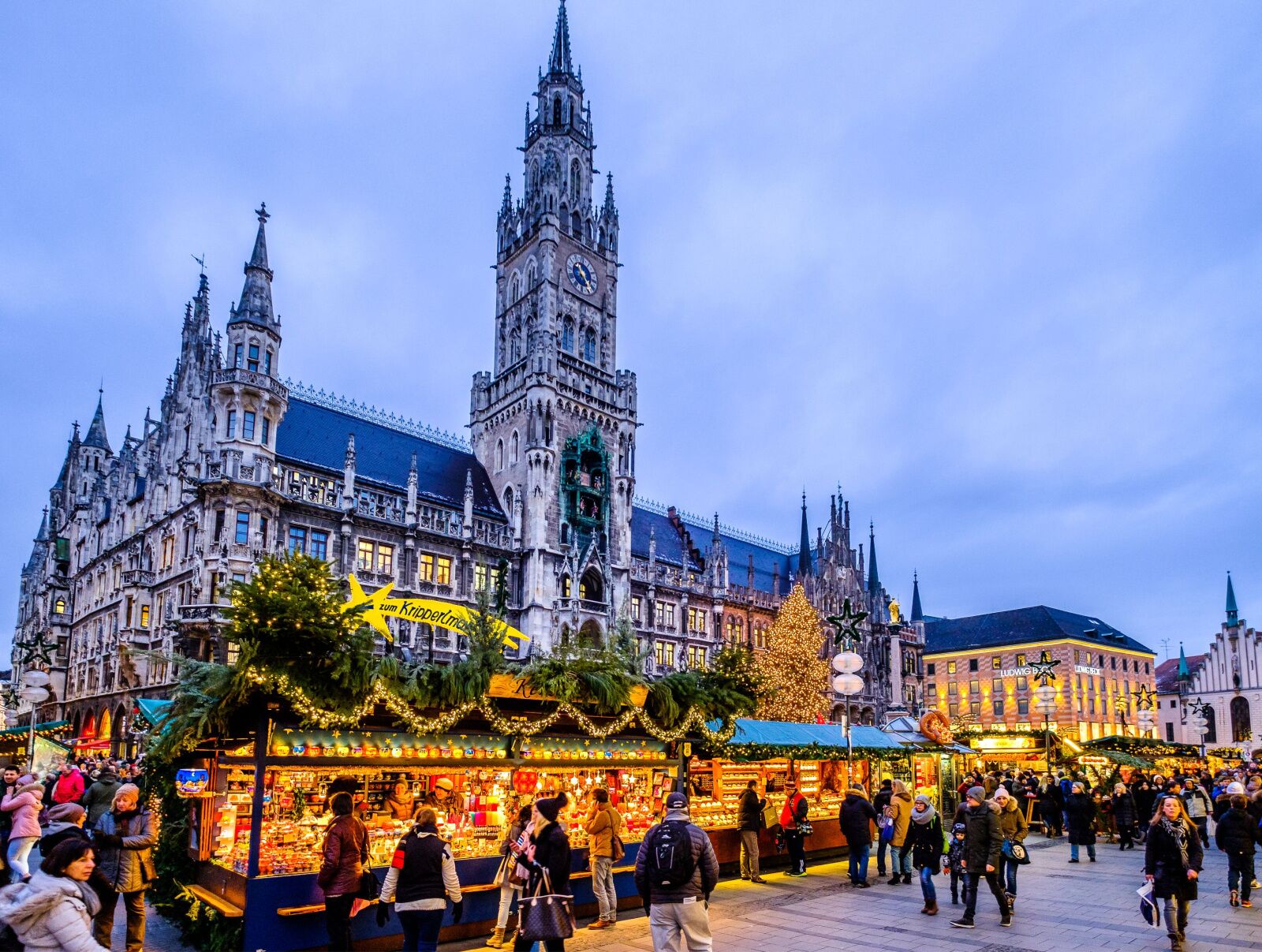
Photo: FooTToo/Shutterstock
Christkindlmarkts are traditional Christmas markets held in the weeks leading up to Christmas. These markets typically last from late November to just before Christmas and are usually open from around noon to 10 PM.
The origins of Christkindlmarkt can be traced back to the Middle Ages when markets were held in towns and cities during the Advent season. These markets featured crafts, food, and other goods, and were intended to provide a festive atmosphere for shoppers and traders alike. It was a place where people from near and far could come to shop for winter.
Visitors can expect to see a wide variety of traditional crafts, foods, and drinks at each market, plus modern options too, of course. Christmas markets have dozens and sometimes hundreds of wooden stalls, each selling handmade goods such as ornaments, candles, and toys. Large markets, like the one at Marienplatz, have live music, restaurants, and shows, and may sometimes have a fee to enter, even if you don’t buy anything.
Most vendors at Christmas markets will take credit cards, though it may be useful to have a few Euros on you just in case. On cold nights, be sure to try a Feuerzangenbowle – mulled wine with a rum shot set on fire. Blow it out early if you want it to be as boozy as possible.
- Admission fee: Varies, most are free
- Address: Varies, but the main one is at Marienplatz
- Usual dates: End of November through Dec 24
Where to stay in Munich
The best place to stay for attending festivals in Munich is probably the city center, specifically in the Altstadt-Lehel or Ludwigsvorstadt-Isarvorstadt neighborhoods. These areas are close to the festival locations (which are in several locations through the city) and offer a variety of accommodations, from budget-friendly hostels to luxury hotels. It’s recommended to book in advance, especially during peak festival season.
We hope you love the spaces and stays we recommend! Just so you know, Matador may collect a small commission from the links on this page if you decide to book a stay. Listed prices are accurate as of the time of publication.
The Niu Brass
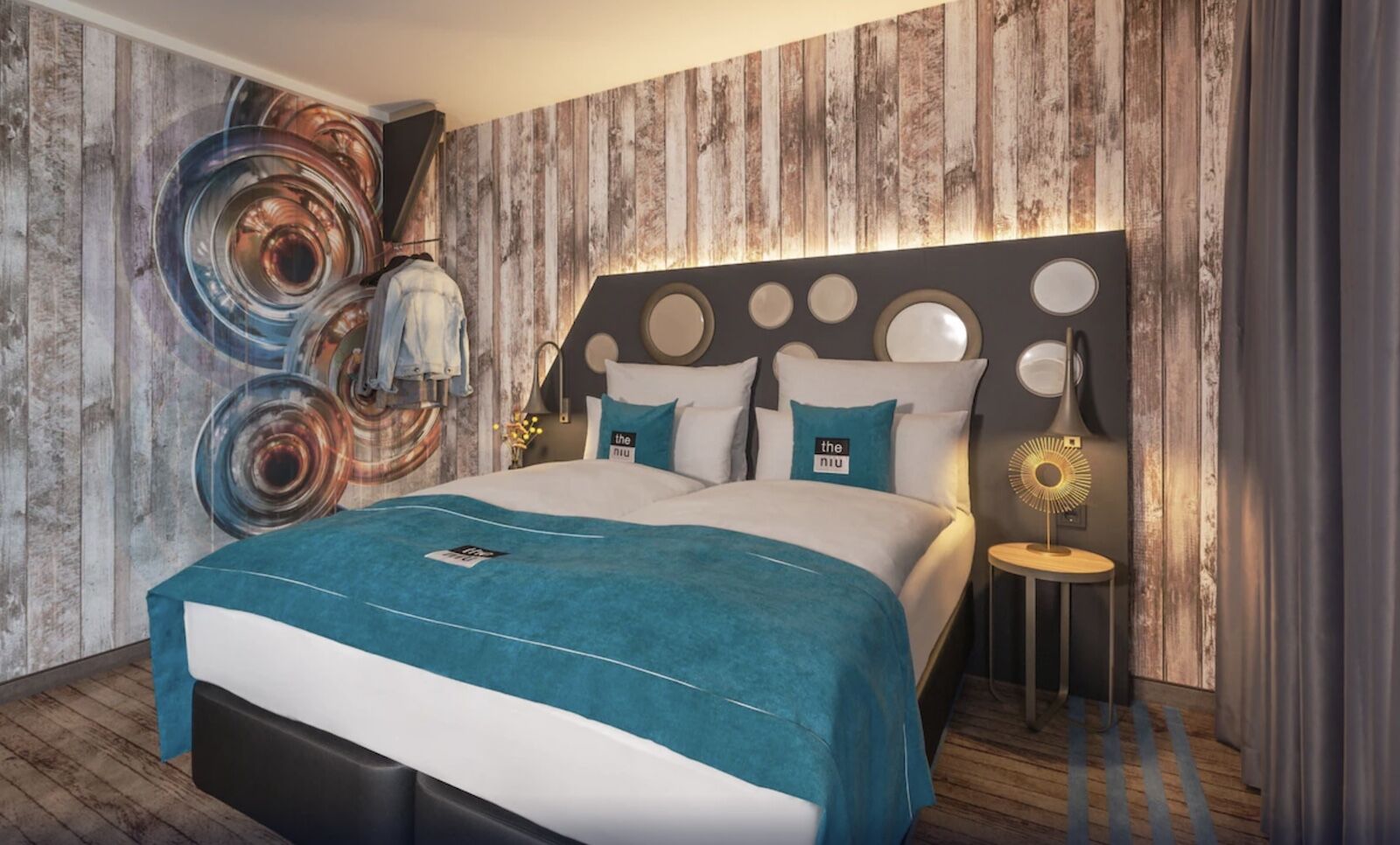
Photo: Expedia
The niu Brass is a stylish and modern hotel in Munich. The hotel is part of the niu Hotel chain, which is known for its unique design and trendy atmosphere. The niu Brass is in the Ludwigsvorstadt-Isarvorstadt neighborhood, just a short walk from the city’s main attractions. Rooms are small but clean and comfy, and rates start at a very reasonable $70 or so a night but can get into the $300s on busy weekends.
Boutique Hotel Germania
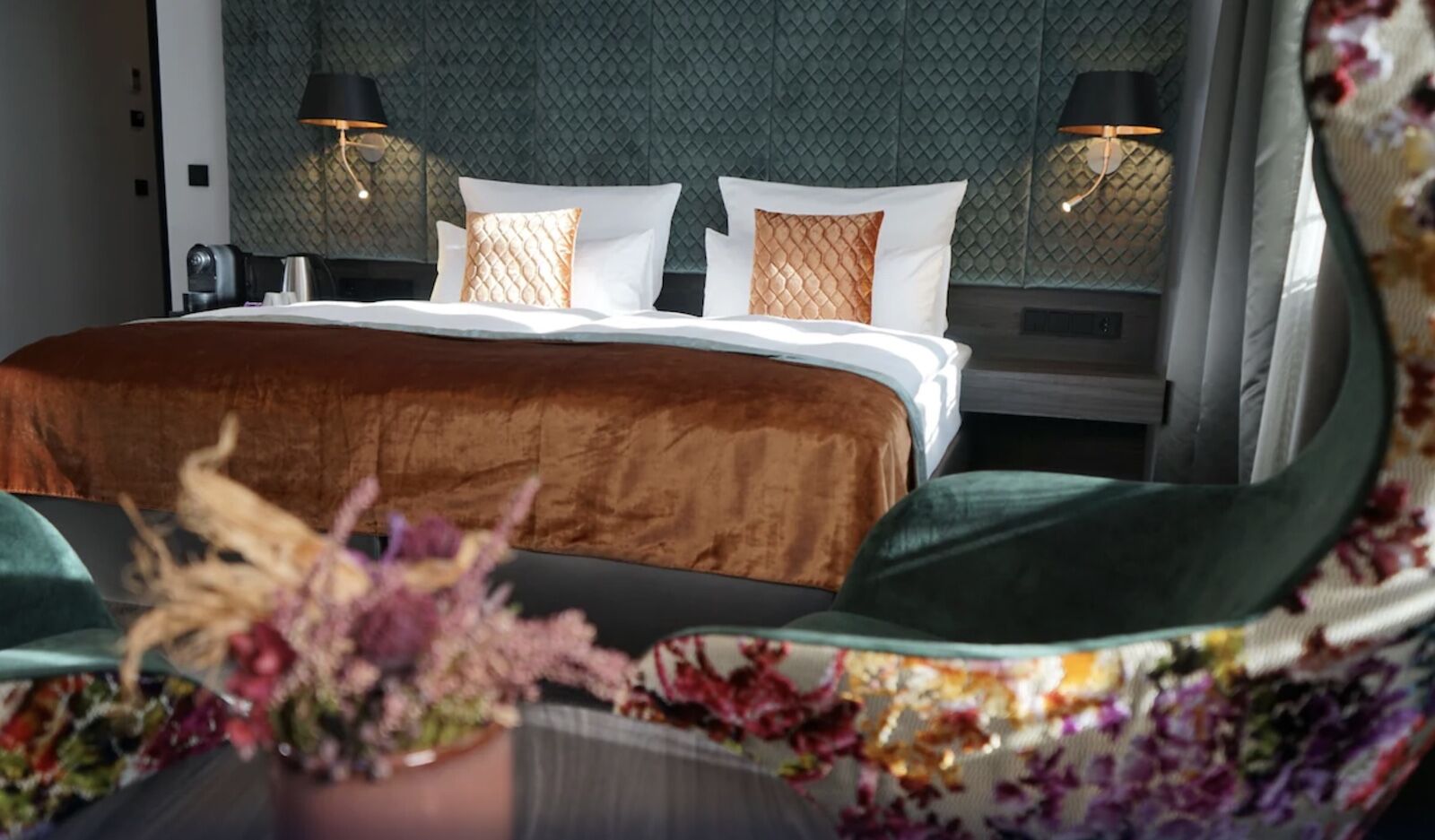
Photo: Expedia
Boutique Hotel Germania is a luxurious and rather charming hotel just a short walk from the city’s main attractions. The on-site restaurant serves delicious German cuisine and you can walk to sights like Marienplatz, the Viktualienmarkt, and the Munich Residence museum. Rooms start around $132 per night.
Hotel Louis
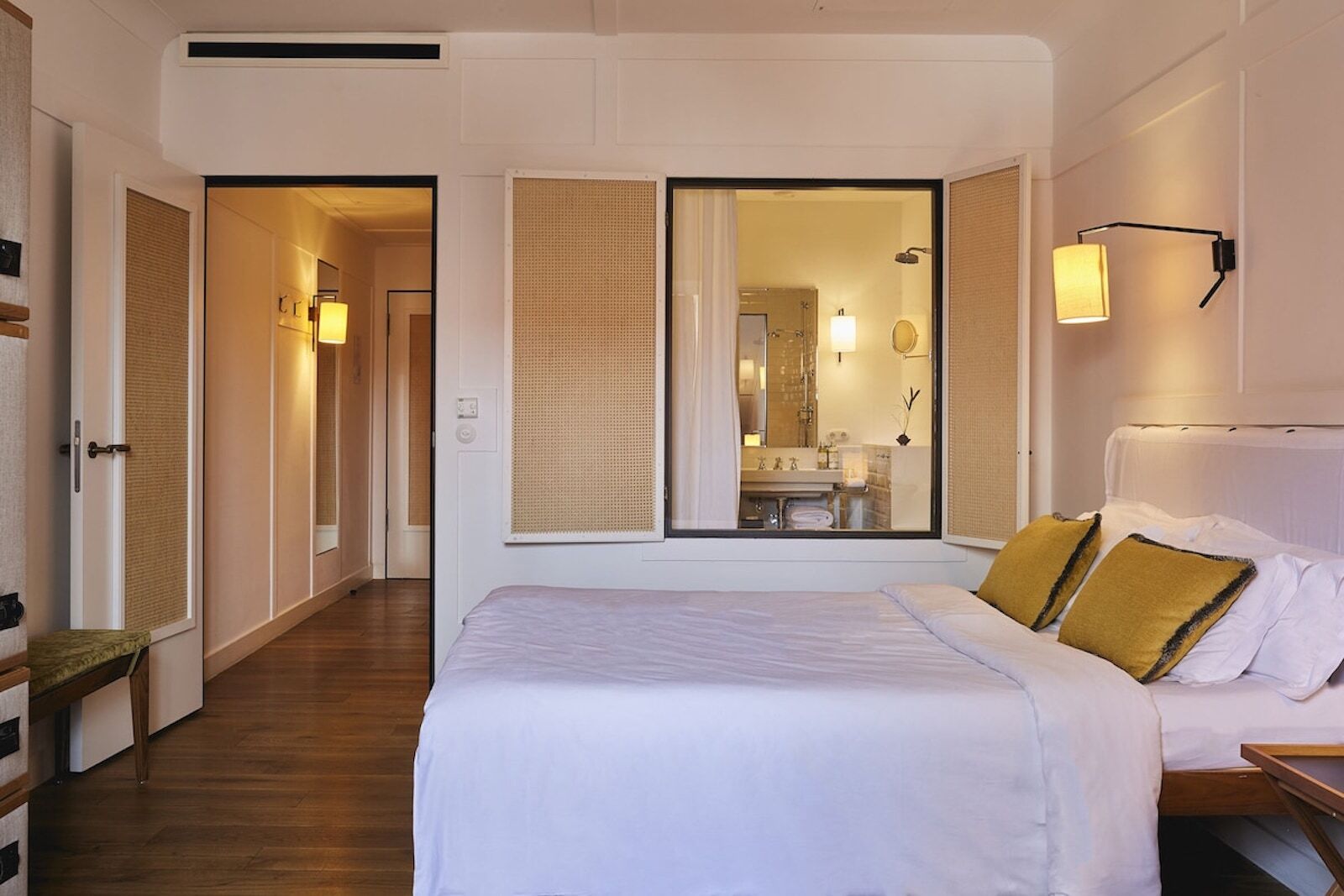
Photo: Expedia
For chic and elegant rooms an easy five-minute walk from the Munich Central Train Station, head to Hotel Louis. Rooms are cozy with windows overlooking cute alleyways and garden areas. Breakfast is included, and the central location makes it easy to walk to some of the best festivals in Munich, including several Christmas markets. Rooms start around $325 a night.